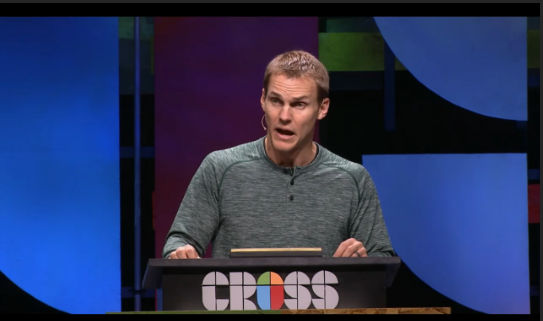A Southern Baptist Convention official told 2,000 college students at a gathering over Christmas break that indifference and fear about the global refugee crisis is closing doors to share the gospel.
David Platt, president of the SBC International Mission Board, told students and campus leaders at the Dec. 27-30 Cross 2016 missions conference in Indianapolis that he had heard stories about the plight of refugees, but everything changed last year when he saw firsthand families fleeing Syria, Afghanistan and Iran huddled in tent cities waiting to enter Macedonia.
“Never before in history have so many people in the world been displaced, put in danger, forced from their homes,” Platt said. “In Syria alone 11 million people, half of the country, has either been displaced or killed.”
Platt said he used the number to illustrate the magnitude of the refugee problem.
“I fear that on a whole we are paying so little attention to this, or if we do pay attention to it, we are looking at it through the lens of political punditry and partisan debates regarding whether or not we should allow relatively few refugees into our land,” he said. “It is a sure sign of American self-centeredness that we have taken the suffering of millions of people and turned it into an issue that is all about us.”
Platt said such talk isn’t only in the political sphere but also is overheard in the church.
“The way so many professing Christians today talk about refugees seems to spring from a foundation of fear, not of faith,” Platt said — “our thoughts and opinions flowing from a view of the world that is far more American than it is biblical and far more concerned with the preservation of our country than it is with the accomplishment of the Great Commission.”
Platt said unprecedented opportunities to share the gospel with first-time hearers abound “if we refuse to retreat from mission in fear, and instead we risk our lives on mission in the faith.”
Platt said there is nothing new about God’s people being discouraged by fear, preaching from the Old Testament story about spies returning from ancient Canaan reporting seemingly insurmountable strength of the enemy.
“God had called them to this land of opportunity,” Platt said, “but the majority of the spies said: ‘We can’t take it. It’s not safe. It’s not secure. We can’t do it. We won’t do it.’”
Platt urged young adults harboring such fear to rely on “the goodness of God.”
“People say: ‘I don’t know if I can give God a blank check with my life. What if he calls me to West Africa in the middle of Boko Haram or in the middle of Somalia’s al-Shabab? What if he calls me to go to northern Iraq or Syria in the middle of ISIS? What about a husband or wife or kids? I mean I could lose everything, my future, all of this.’”
“The thought of a blank check with your life may be frightening to you, but if it is I just want to remind you don’t forget who you’re giving the blank check to,” Platt said. “He is good.”
“If you can trust him to save you from your sin for all eternity, then surely you can trust him to lead you in your life on this earth,” the mission leader reasoned.
Platt said every Christian is called either to be a “sender” or “goer” in God’s “plan to make his gospel and his glory known in all nations among all the peoples of the earth.”
“I’m not calling anybody today to move tomorrow to the Middle East,” he said. “I’m not calling anybody today to make some rash vow based upon manipulated emotion.”
“For that matter, I’m not even calling anybody to make a decision like this alone,” Platt said, urging young people who believe the Lord is leading them into mission service to go to their church “and say to that church ‘I want to be sent.’”

